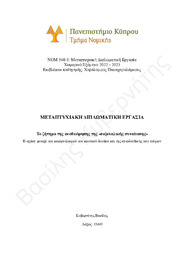| dc.contributor.advisor | Παπαχαραλάμπους, Χάρης | el |
| dc.contributor.author | Κυβερνήτης, Βασίλης | el |
| dc.coverage.spatial | Κύπρος | el |
| dc.creator | Κυβερνήτης, Βασίλης | el |
| dc.date.accessioned | 2023-02-28T06:00:24Z | |
| dc.date.available | 2023-02-28T06:00:24Z | |
| dc.date.issued | 2022-12 | |
| dc.identifier.uri | http://gnosis.library.ucy.ac.cy/handle/7/65497 | en |
| dc.description.abstract | Η παρούσα εργασία καταπιάνεται με την έννοια της «σεξουαλικής συναίνεσης» και πώς αυτή χρησιμοποιείται ως κριτήριο σύστασης σεξουαλικών αδικημάτων. Η «σεξουαλική συναίνεση» ως κριτήριο σύστασης σεξουαλικών αδικημάτων έχει δύο όψεις: τη μη παραχώρηση και την παραχώρηση συναίνεσης. Σχετικά με την πρώτη όψη, τη μη παραχώρηση συναίνεσης, είναι πλέον ευρέως αποδεκτό και νομικά καθιερωμένο ότι αυτή αποτελεί ένα από τα κύρια κριτήρια σύστασης σεξουαλικών εγκλημάτων. Παρόλα αυτά, η παρούσα μορφή της σεξουαλικής συναίνεσης εμπεριέχει ηθικά και νομικά εμπόδια (π.χ. την ανάγκη ενισχυτικής μαρτυρίας για σεξουαλικά εγκλήματα) που δυσκολεύουν την απόδειξη μη παραχώρησης συναίνεσης του θύματος σε πράξεις σεξουαλικής φύσης.
Όσον αφορά τη δεύτερη όψη, την παραχώρηση συναίνεσης, φαινομενικά δεν θυματοποιείται κάποιο από τα μέρη της σεξουαλικής πράξης αφού εκφράζεται η κοινή θέληση των μερών. Ωστόσο, υπάρχουν διάφορες περιπτώσεις που παρά την κοινή παραχώρηση συναίνεσης, το Ποινικό Δίκαιο (ΠΔ) θεωρεί τη συναίνεση δευτερευούσης σημασίας. Συγκεκριμένα, το ΠΔ διώκει τα εμπλεκόμενα μέρη στη βάση της διασφάλισης της προστασίας τους και όχι στη μη παραχώρηση συναίνεσης (π.χ. στις πρακτικές σαδομαζοχισμού κλπ.). Mε αυτόν τον τρόπο, διασφαλίζεται το συμφέρον του κοινωνικού συνόλου ενώ παραμερίζονται οι ατομικές ελευθερίες των μερών και ως εκ τούτου η συναίνεσή τους. Γίνεται επομένως αντιληπτό πως η «σεξουαλική συναίνεση» είναι ένα εξαιρετικά πολύπλοκο κριτήριο το οποίο αποτελεί μια μεταβαλλόμενη έννοια και αντικείμενο ακαδημαϊκής μελέτης.
Σε αυτό το πλαίσιο, η εργασία μελετά εάν μπορούν οι σύγχρονες θεωρίες να «ισορροπήσουν» από τη μια την ανάγκη προστασίας του θύματος σεξουαλικών εγκλημάτων, και από την άλλη την ανάγκη διαφύλαξης της σεξουαλικής αυτονομίας του. Mε αυτό τον τρόπο, η διπλωματική εργασία επιδιώκει να συνεισφέρει στην ελληνόφωνη βιβλιογραφία, εξετάζοντας τις νέες ακαδημαϊκές θεωρίες που αφορούν τη «σεξουαλική συναίνεση». | el |
| dc.description.abstract | This paper deals with the theoretical and practical implications of sexual consent as a legal criterion determining sexual offences. This legal criterion has two forms: the non-consent and the consent to sexual acts.
Regarding the first form, the non-consent, nowadays is recognised in the legal spectrum as one of the main factors indicating the existence of sexual offences. However, the current form of sexual consent across many western jurisdictions involves moral and legal obstacles that, in some cases, harden the burden of proof of the non-consent of the victim to the proposed sexual acts.
Regarding the second form, the existence of consent, at first glance it doesn’t victimise the participants to the sexual act since their common will is communicated reciprocally. Nevertheless, there are various cases where, despite the common exteriorisation of consent by the parties, the criminal law considers sexual consent to be of secondary importance. Some western jurisdictions prosecute the involved parties to ensure their protection, as in cases with sadomasochistic practices, where the implementation of the prosecution is diminishing the importance of the sexual consent of the parties. By doing so, the individual freedoms of the parties and their consent are set aside in order to safeguard the public interest. Thus, sexual consent must be understood as an extremely complex and evolving criterion of academic interest.
In this context, the paper considers whether modern theories can accommodate the need to protect the victims of sexual offences and the need to preserve sexual autonomy of the parties. In this way, the paper seeks to contribute to the Greek-language literature, by examining contemporary academic theories concerning sexual consent. | en |
| dc.language.iso | gre | en |
| dc.publisher | Πανεπιστήμιο Κύπρου, Σχολή Κοινωνικών Επιστημών και Επιστημών Αγωγής / University of Cyprus, Faculty of Social Sciences and Education | |
| dc.rights | Attribution-NonCommercial-NoDerivs 3.0 Greece | * |
| dc.rights | info:eu-repo/semantics/openAccess | en |
| dc.rights | Open Access | en |
| dc.rights.uri | http://creativecommons.org/licenses/by-nc-nd/3.0/gr/ | * |
| dc.title | Το ζήτημα της αναθεώρησης της «σεξουαλικής συναίνεσης». Η σχέση μεταξύ του πατερναλισμού του ποινικού δικαίου και της αυτοδιάθεσης των ατόμων. | el |
| dc.type | info:eu-repo/semantics/masterThesis | en |
| dc.contributor.committeemember | Παπαχαραλάμπους, Χαράλαμπος | el |
| dc.contributor.department | Τμήμα Νομικής / Department of Law | |
| dc.subject.uncontrolledterm | ΣΕΞΟΥΑΛΙΚΑ ΑΔΙΚΗΜΑΤΑ | el |
| dc.subject.uncontrolledterm | ΘΕΩΡΙΕΣ ΤΗΣ ΣΕΞΟΥΑΛΙΚΗΣ ΣΥΝΑΙΝΕΣΗΣ | el |
| dc.subject.uncontrolledterm | ΠΑΤΕΡΝΑΛΙΣΜΟΣ | el |
| dc.subject.uncontrolledterm | ΑΥΤΟΔΙΑΘΕΣΗ ΤΩΝ ΑΤΟΜΩΝ | el |
| dc.subject.uncontrolledterm | ΘΕΩΡΙΑ ΠΟΙΝΙΚΟΥ ΔΙΚΑΙΟΥ | el |
| dc.subject.uncontrolledterm | JURISPRUDENCE | en |
| dc.subject.uncontrolledterm | SEXUAL CONSENT | en |
| dc.subject.uncontrolledterm | PATERNALISM | en |
| dc.subject.uncontrolledterm | SELF-DETERMINATION | en |
| dc.author.faculty | Σχολή Κοινωνικών Επιστημών και Επιστημών Αγωγής / Faculty of Social Sciences and Education | |
| dc.author.department | Τμήμα Νομικής / Department of Law | |
| dc.type.uhtype | Master Thesis | en |
| dc.contributor.orcid | Παπαχαραλάμπους, Χαράλαμπος [0000-0002-6194-4764] | |
| dc.gnosis.orcid | 0000-0002-6194-4764 | |


